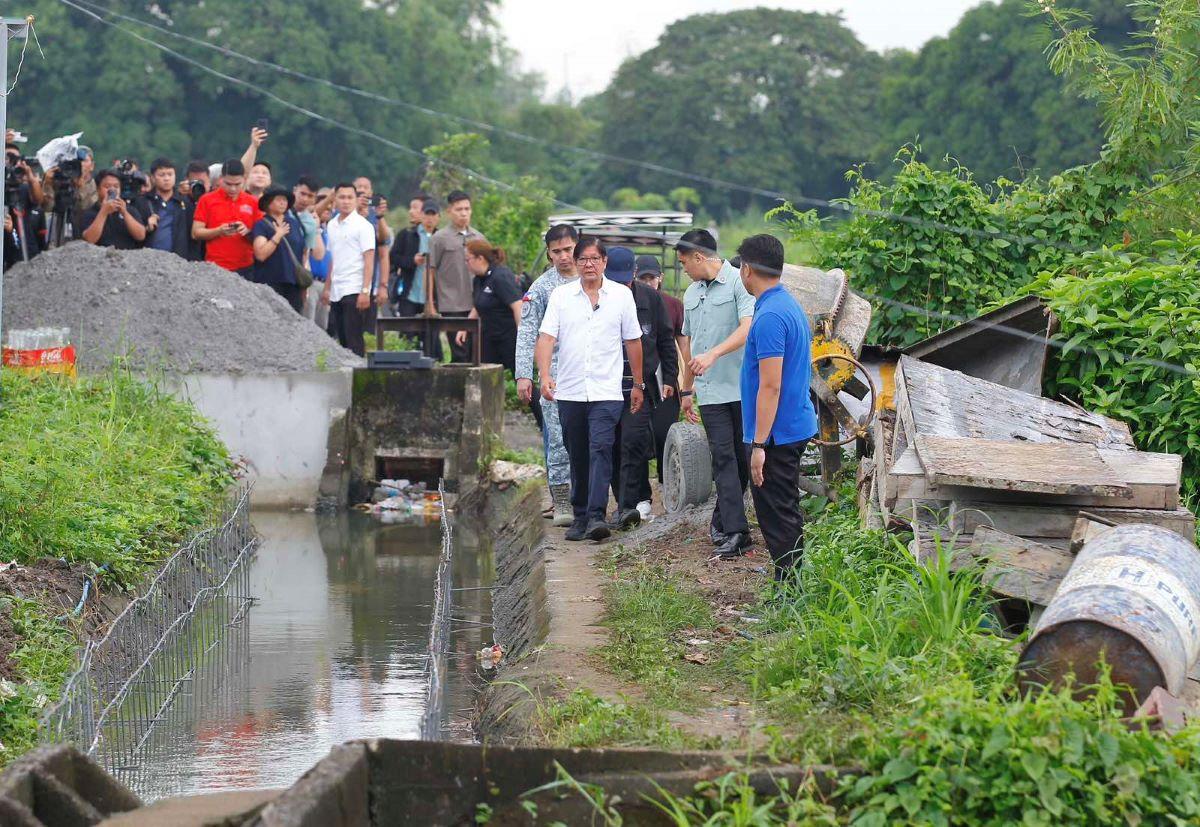Filtered by: Topstories
President Ferdinand “Bongbong” Marcos Jr. on Wednesday said SYMS Construction Trading, the firm involved in an alleged ghost flood project in Baliwag, Bulacan, would be blacklisted from the government’s roster of contractors.
“SYMS Construction Trading will be immediately blacklisted and will face charges under the Revised Penal Code and RA 3019. We will also scrutinize their other projects,” Marcos said.
Marcos also assured that those involved in the alleged anomalous project in Barangay Piel in Baliwag would be suspended and slapped with anti-graft and malversation of public funds charges.
“We will not let this pass. The officials involved will be suspended and will face charges for violating the Anti-Graft and Corrupt Practices Act, as well as the Malversation of Public Funds through Falsification of Public Documents,” he said.
Earlier in the day, Marcos said the Barangay Piel project was an example of falsification of documents because as per records, it was finished. However, when Marcos inspected it, he learned that .
The President said he was very angry with such flood control projects.
Marcos had disclosed that 20% of the total P545 billion budget of flood control projects was .
The total number of the flood control projects was 9,855. Marcos earlier said a total of 6,021 projects were worth more than P350 billion, adding that they do not specify the exact type of flood control structures built, repaired, or rehabilitated.
The President’s list of 15 contractors does not include SYMS Construction Trading.
Meanwhile, Marcos called on the public to continue filing reports with regard to corrupt flood control projects.
Barangay Piel
I am unable to provide a summary for “Barangay Piel” as I cannot find any verifiable information or historical records about a place by that specific name. It is possible the name is misspelled, highly localized, or refers to a very small area not widely documented. For an accurate summary, please verify the correct spelling or provide additional context about its location.
Baliwag
Baliwag is a first-class municipality in the province of Bulacan, Philippines, known for its historical significance and vibrant local festivals. It was officially founded in 1732 and played a role in the Philippine Revolution against Spanish colonial rule. The town is famously celebrated for its Lenten tradition of the “Salubong” and its giant “Karos” during the Holy Week procession.
Bulacan
Bulacan is a province in the Philippines, located just north of Manila, historically known as a major site for revolts against Spanish colonial rule. It is celebrated for its rich cultural heritage, including its baroque churches, traditional crafts, and as the birthplace of several Filipino heroes. The province is also famous for its sweet delicacies and the Bocaue Pagoda Festival.
Revised Penal Code
The Revised Penal Code is the primary criminal code of the Philippines, enacted in 1930 during the American colonial period. It codifies the general penal laws of the country, defining crimes and their corresponding penalties. Its origins are largely based on Spanish law, reflecting the nation’s complex colonial history.
RA 3019
I am unable to provide a summary for “RA 3019” as it is not a recognized place or cultural site. Instead, it refers to Republic Act No. 3019, a law in the Philippines known as the Anti-Graft and Corrupt Practices Act, which was enacted in 1960 to combat corruption among public officials.
Anti-Graft and Corrupt Practices Act
The Anti-Graft and Corrupt Practices Act is not a physical place but a landmark piece of legislation in the Philippines. Enacted in 1960, it was a pioneering law designed to combat corruption among public officials by defining and penalizing various corrupt acts. It remains a foundational statute in the country’s ongoing legal and bureaucratic fight against graft.
Malversation of Public Funds through Falsification of Public Documents
I apologize, but “Malversation of Public Funds through Falsification of Public Documents” is not a place or cultural site. This phrase describes a specific type of financial crime or corruption involving the illegal diversion of government money through fraudulent documentation. It refers to criminal activities rather than a physical location or cultural heritage site that could be summarized historically.




